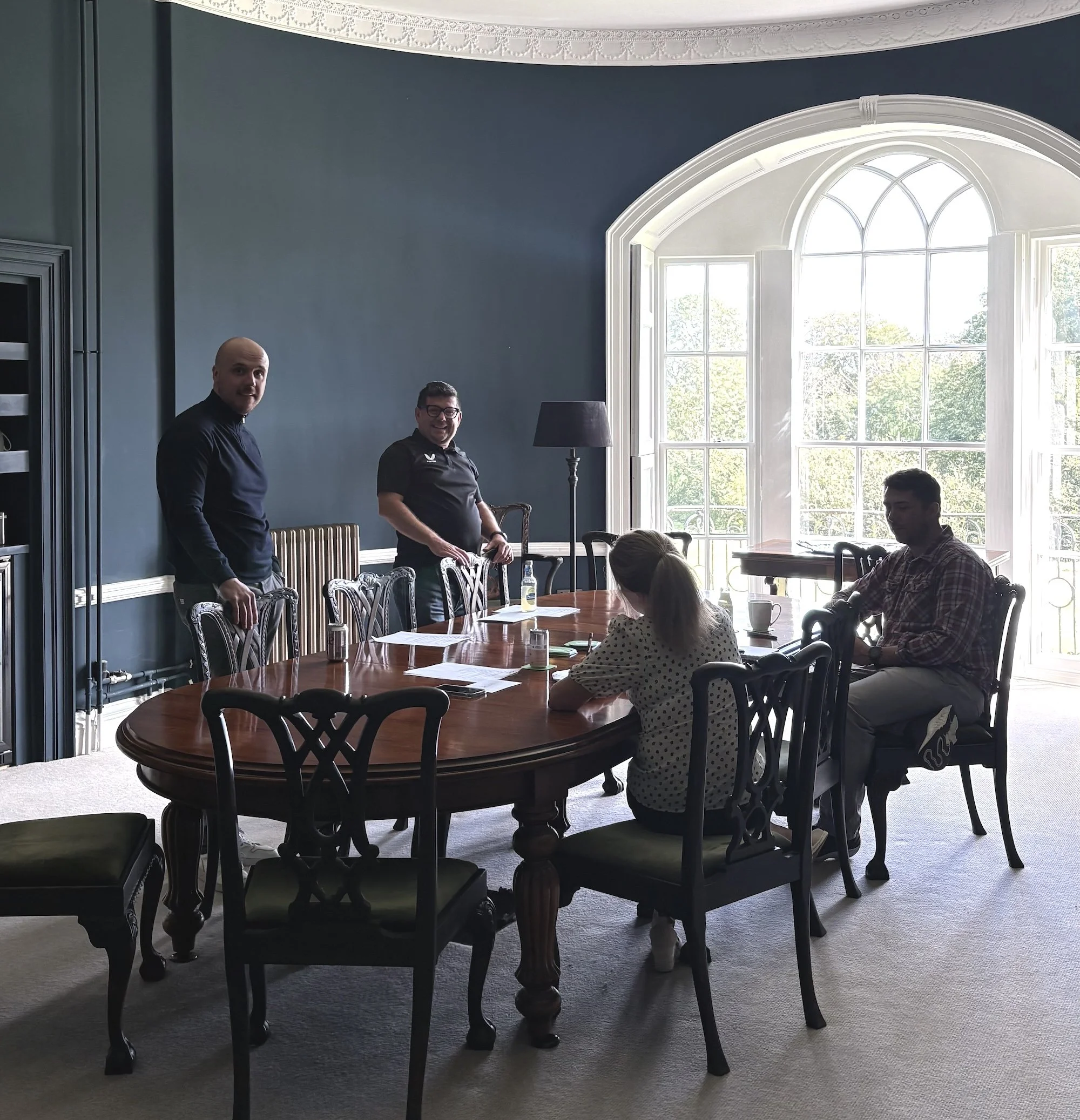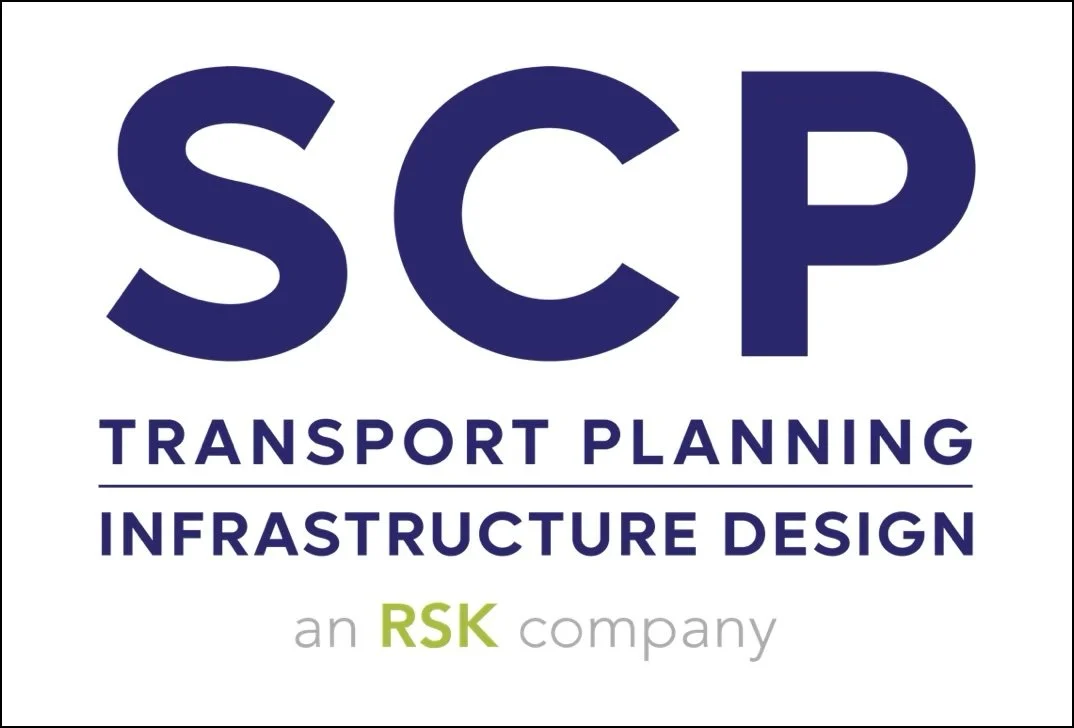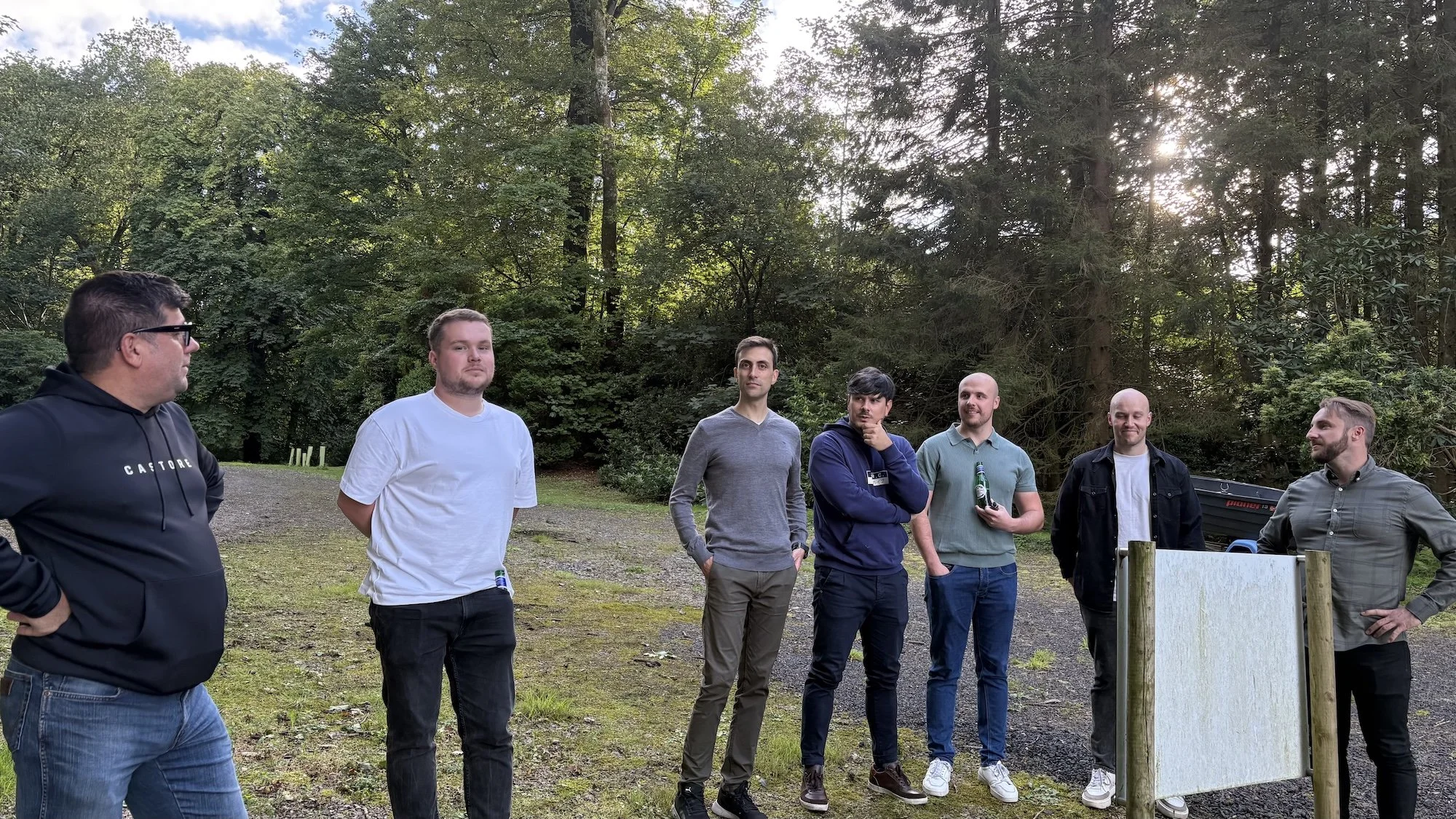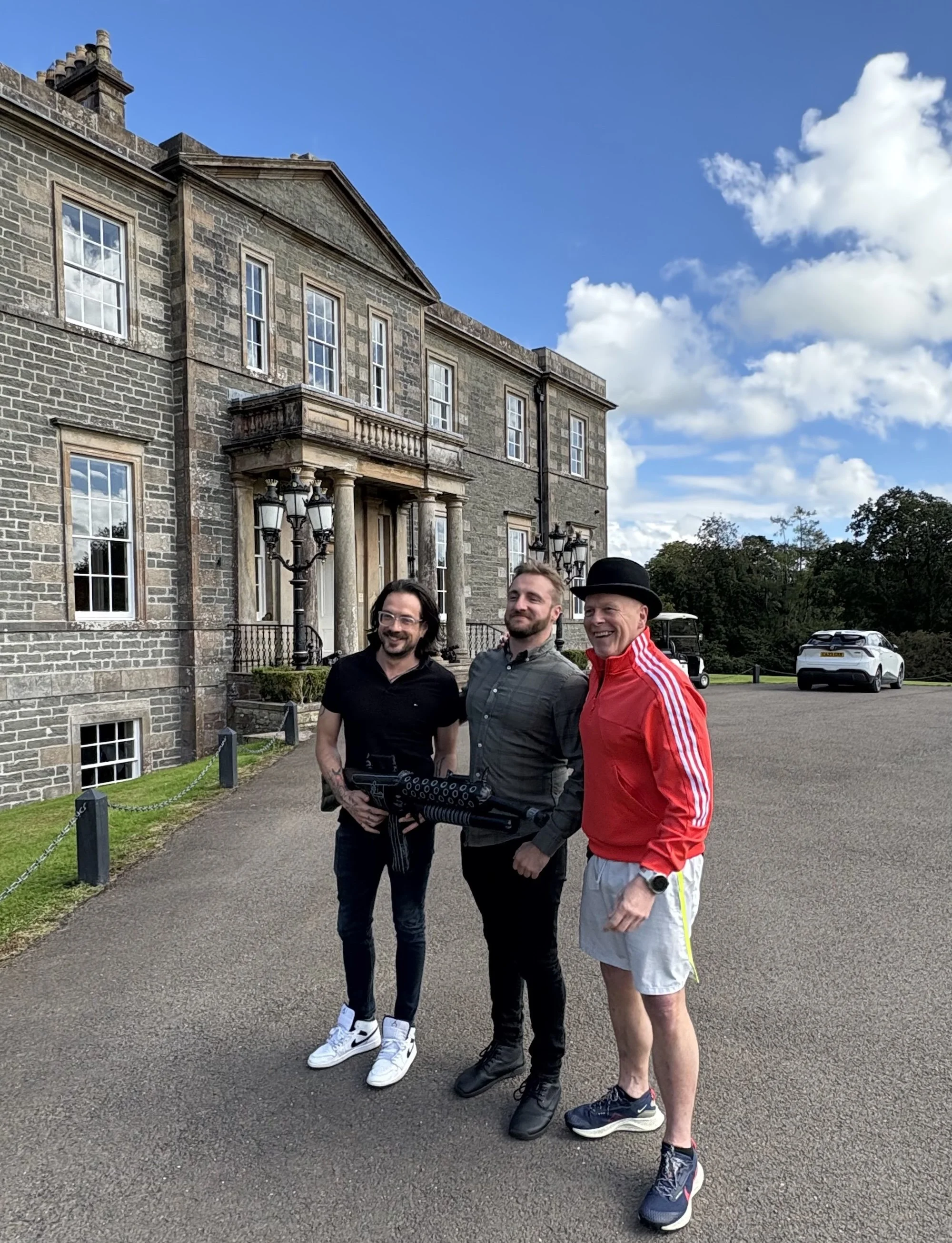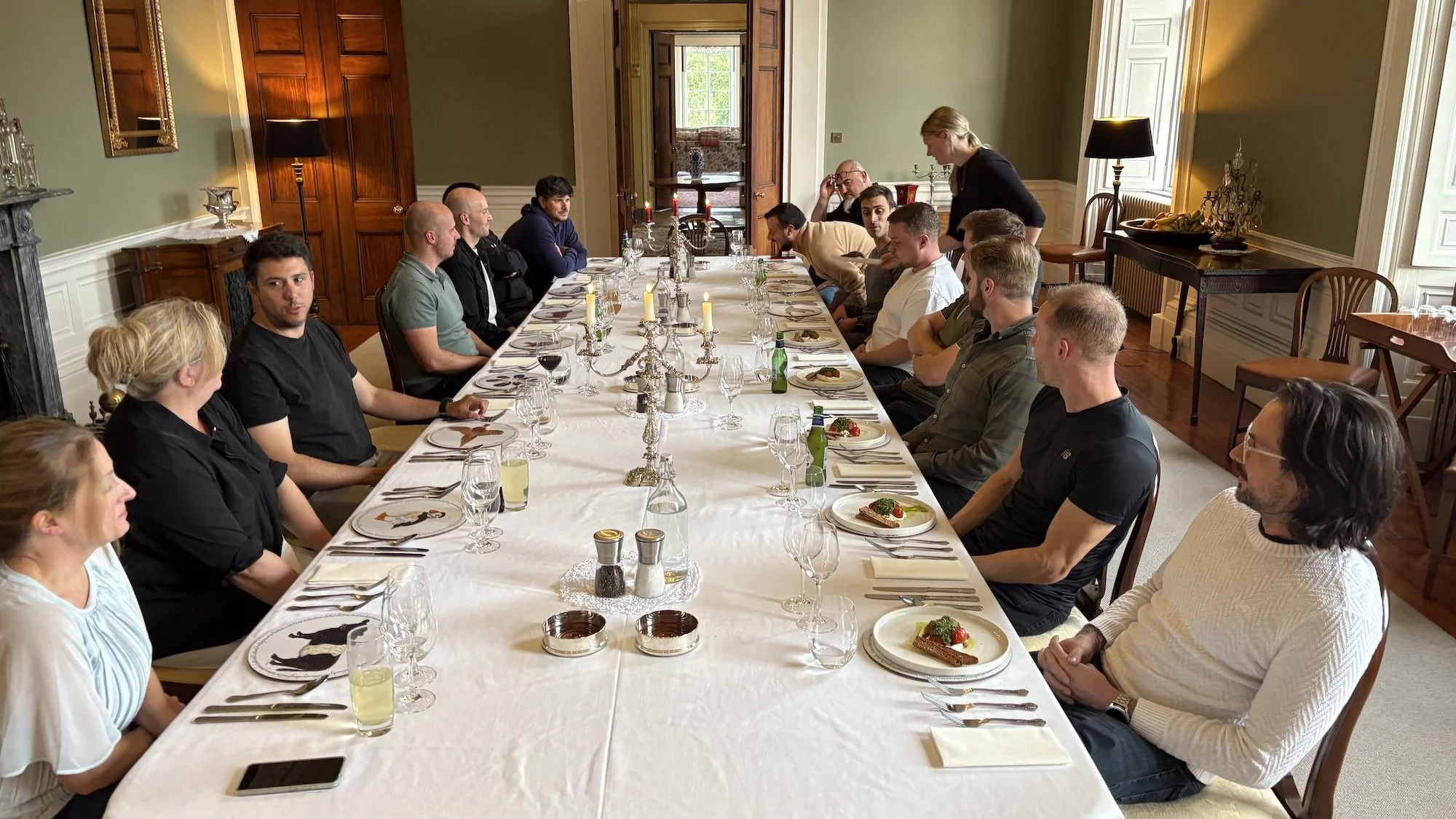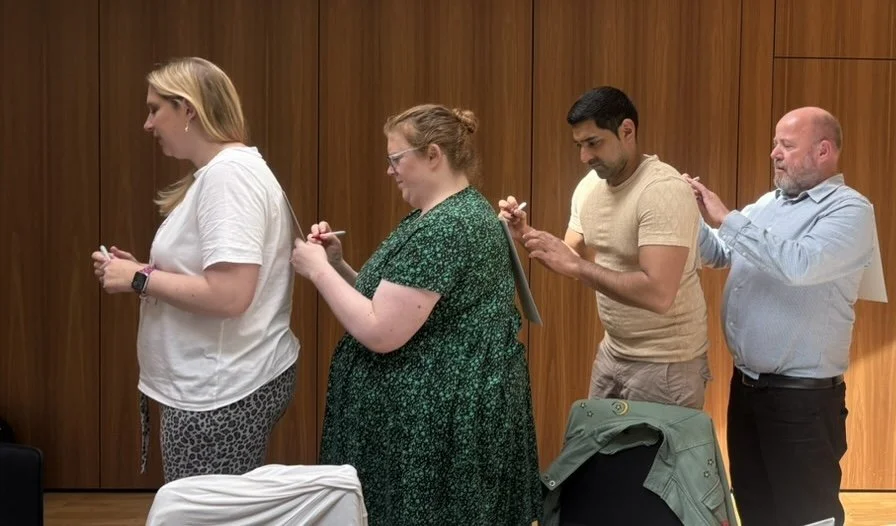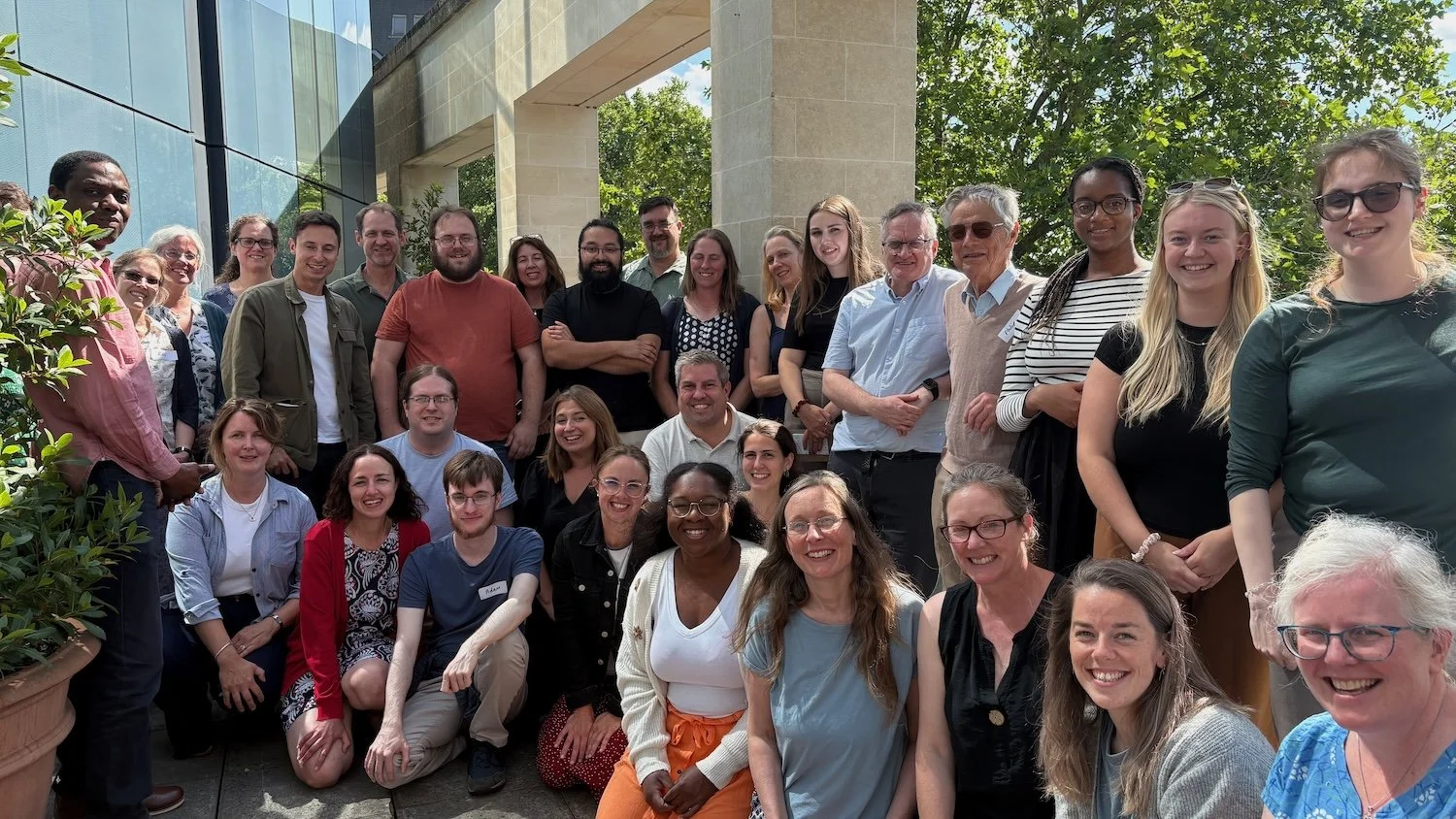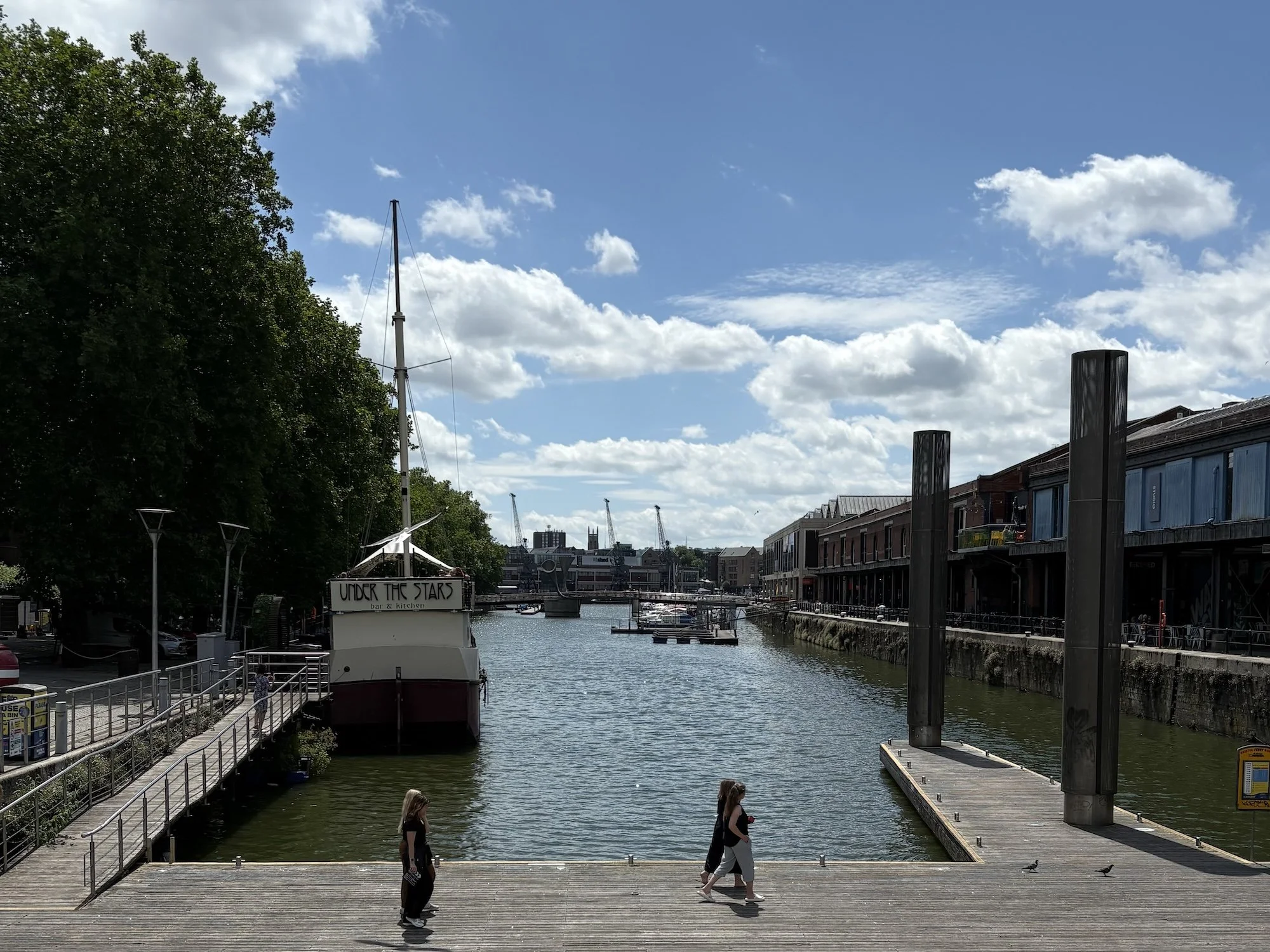SCP Leadership off-site and team building
What they needed: SCP’s leadership wanted to: clarify future roles so the organisation is future fit; improve quality, performance, and efficiency; and reconnect and strengthen collaboration across different locations and functions.
What we delivered: A two-day off-site that blended strategy and planning workshops, with a creative and memorable team-building activity.
Result: Clarity and alignment around new roles, an action plan to implement the changes, plus a renewed sense of pride in SCP. Participants left energised, connected, and with great memories.
Client: SCP Infrastructure
Project: Leadership Off-site and Team Building | September 2025
What they needed: SCP has transitioned from a small independent consultancy into part of the RSK Group. While this has brought new opportunities, it’s also created cultural and structural complexity. The leadership team wanted to:
Clarify roles and expectations as part of integration.
Improve quality, performance, and efficiency for the future.
Strengthen collaboration and consistency across regional offices.
Reconnect the team and strengthen relationships.
What we delivered: Growth Space designed a two-day off-site, including two strategy and planning workshops to create clarity around future strategy and build a practical shared implementation plan. We also made time for a fun creative team chak an Apprentice-style video challenge, with cross-functional teams managing a fictional budget, creating short films on themes such as Who are SCP? or Why Work With Us?.
Result: The offsite produced clearer understanding of how roles would change, stronger cross-regional connections, and a renewed sense of pride in SCP. Participants left energised, connected, and with practical commitments to take back to their teams.
“We’ve been talking about restructuring for months without implementing anything, Now we are aligned, have clarity on what the changes mean and a practical action plan to make it happen.”
SCP Infrastructure - Leadership Off-site
The Context
SCP is a transport planning and infrastructure consultancy, acquired by RSK in 2022. The shift to a large international group brought access to new markets and growth potential, but also raised challenges, including internal alignment and the transition from small projects to large, multidisciplinary work. The business was looking at clearer definition between project managers and technical lead roles, but decisions needed to be made to align on this and plan how to implement.
The offsite was designed to address these realities: helping people connect across regions, explore evolving roles, and collaborate creatively on a shared output, reinforcing both team spirit and confidence in SCP’s future.
SCP Infrastructure - Team Building
Discovery & Design:
Ahead of the event, Growth Space conducted stakeholder interviews, an employee survey, and planning sessions to identify needs. Themes included:
A need for clarity between the project manager and technical lead roles.
Questions about SCP’s integration with RSK.
Concerns around communication, workload, and collaboration across regions.
A strong desire for an energising, inclusive event, not a “dry” away day.
The design centred on three core elements:
Clarity & Connection: A strategic workshop to explore expectations and team needs.
Collaboration & Communication: An Apprentice-style video challenge where mixed teams produced creative outputs under time pressure.
Learning & Forward Action: A wrap-up session to reflect, capture insights, and agree on commitments.
This blend ensured serious business issues were addressed while also giving space for creativity, humour, and team bonding.
Video Challenge - Team Building Activity
Delivery:
Held at Argrennan House in Scotland, RSK’s country house, the offsite brought together 25 leaders, project managers, specialists and leaders from the 5 regional offices across the UK.
Day 1: Arrivals, an outdoor activity, dinner and a pub quiz to ease people into the experience.
Day 2: A strategy workshop where participants mapped what was changing in SCP, discussed what “quality, performance, and efficiency” look like, and shared commitments to support the transition.
Day 2: The SCP Video Challenge: teams planned, scripted, and filmed short videos on themes such as “Who are SCP?” and “Why Work With Us?”. Each had a fictional £500 budget to manage, deciding whether to allocate it to props, expert coaching, or additional resources. The challenge ended with a high-energy showcase and awards ceremony.
Day 3: Reflections and action planning, to ensure that leaders had a clear map for how to implement the changes and how to communicate them to the wider business.
The insights, actions, and commitments captured during the offsite were captured and turned into a Change Management Plan with KPIs, timeframes and clear accountability. SCP leadership has committed to embedding role expectations, improving cross-office collaboration, and following through on agreed priorities
What They Learned
The offsite built both practical skills and mindset shifts. Real skills developed:
Project planning and time management.
Budgeting and resource allocation.
Presenting and storytelling.
Cross-functional collaboration.
Decision-making under pressure.
SCP - Leadership Off-site
The Impact
A plan to implement and communicate significant organisational changes that would lay the foundations for the future.
Connected to colleagues across functions, regions, and teams.
Valued, heard, and included, regardless of personality or role.
Energised, optimistic, and proud of what we do together.
Inspired by the creativity, humour, and talent in the room.
Feedback
Feedback showed a strong impact: participants described the event as fun, memorable, energising, and purposeful.
“The design was clever, creative and completely relevant to our work.”
“I now have a really clear idea of the changes to our roles and plans to improve processes and most importantly a plan and timeframe to implement it.”
“I rarely see colleagues from the other regional offices, and this was a chance to work with them and build connections that will last.”
Would you like to hold a leadership offsite that builds connection, creates memories and results in strategy and action?
Get in touch about our Leadership Off-sites >
Royal College of Podiatry - Team Coaching
What they needed: To rebuild trust, improve collaboration, and align a dispersed team around shared goals and values following previous conflict and organisational change.
What we delivered: A tailored, Systemic Team Coaching programme blending in-person and virtual workshops.
Result: Stronger connection, increased psychological safety, clearer shared goals, and improved accountability.
Client: Royal College of Podiatry
Project: Team Coaching Programme | Spring 2025
What they needed: To rebuild trust, improve collaboration in a fully remote team. To align behind shared goals and values following some tensions and organisational transformation.
What we delivered: A systemic team coaching programme blending in-person and virtual workshops with practical tools for embedding change.
Result: Stronger connection, increased psychological safety, shared purpose and goals, and greater collective accountability.
“Team Coaching helped us understand each other better, reset how we work together, and start building a stronger team culture.”
Royal College of Podiatry - Team Coaching
The Context
The Royal College of Podiatry is the UK’s professional body for podiatrists, representing members and advancing the profession. The organisation was going through transformation and launching a new five-year strategy under a new Chief Executive.
Growth Space was invited to work with a remote team which had experienced a breakdown in trust, motivation, communication and collaboration. With team members spread across the UK and a mix of long-standing staff and new joiners.
The leadership recognised the need for structured support to reconnect the team, rebuild trust, and create a shared way forward.
Discovery & Design:
We began with a discovery phase to understand the team’s reality. This included:
A confidential team survey measuring trust, psychological safety, conflict, accountability, and results-focused.
Personality profiling to surface communication styles, strengths, and preferences.
Review of organisational strategy, values, and current team priorities.
The findings confirmed the need to rebuild trust, improve constructive challenge, and align the team’s purpose and goals with the wider organisation.
Drawing on Peter Hawkins’ Five Disciplines of Systemic Team Coaching and Patrick Lencioni’s Five Dysfunctions of a Team, we designed a tailored five-part programme over three months, combining one full-day in-person workshop and shorter online sessions. We also introduced practical tools: Personal User Manuals and a Team Charter to make agreements visible and actionable.
Delivery:
The programme followed the Systemic Team Coaching journey:
Connecting to Purpose and Stakeholders. We explored why this team exists, who it serves, and the expectations of its stakeholders, linking team purpose to the organisation’s strategic goals.
Agreeing on Goals, Roles and Focus . Through facilitated discussion, we identified shared goals and clarified roles to reduce duplication, ambiguity, and silos.
Strengthening Trust, Behaviours and Team Habits . The heart of the work: building psychological safety, surfacing tensions, and agreeing on new norms through the Team Charter covering behaviours, communication, meetings, decision-making, and accountability.
Improving System-Wide Relationships We explored how the team collaborates with the wider organisation, and identified barriers to influence and connection.
Embedding Reflection and Growth We closed with a focus on sustaining progress, creating habits for regular reflection, celebrating wins, and keeping the Team Charter alive.
Alongside Hawkins’ 5 Disciplines of Team Model, Patrick Lencioni’s framework helped us explore positive behaviours and what happens when they’re missing:
Trust and psychological safety
Healthy conflict
Commitment
Accountability
Focus on collective results
The Impact
The team reported a stronger connection, better understanding of each other’s working styles, and greater willingness to give and receive constructive challenge.
100% felt more connected to their colleagues than they felt before the programme.
100% felt more positive about being part of the team than at the start.
70% said they know and understand teammates better, including how they like to work, communicate, and think.
100% reported that personal user manuals and personality profiling helped them understand others’ communication and working styles.
Feedback
People enjoyed the mix of activities, including reflection, discussion, and group work.
80% rated the facilitation as highly effective in helping the team reflect and make progress.
Testimonials
“Getting to know the team better has made such a difference to how we work together. ”
“The personality profiles and user manuals helped me understand how each team member likes to work — it’s already making collaboration easier.”
“I now feel more positive about being part of this team than I did before.”
“We’re now having more open conversations and understand each other’s perspectives.”
Would you like to help your team work better together?
Get in touch about our Team Coaching Programmes.
Vitis Regulatory Team Away Day
What they needed: An away day to connect with colleagues on a creative activity that felt memorable, fun and different.
What we delivered: A creative challenge where teams competed to produce a short, fun video about their business.
Result: 100% of participants said it helped build cross-team relationships.
Client: Vitis Regulatory
Project: Summer Team Away Day 2025
What they needed: A high-energy, high-impact team day to connect colleagues across departments, bring values to life, and spark creative collaboration.
What we delivered: A unique Team Away Day that was bold, fun, creative and meaningful
Key result: 100% of participants said it helped build cross-team relationships and would recommend it to another team
“The best team away day I’ve ever done.”
Vitis Regulatory Team Away Day
The Context
Vitis Regulatory is a consultancy with a distributed team spanning multiple departments and regions. They wanted their 2025 team day to feel anything but corporate. The goal? Connection, creativity, and celebration, not awkward games or forced fun.
The brief: make it bold, make it meaningful, and above all, make it memorable.
What we delivered:
We designed a full-day creative experience: The V Factor, a fast-paced challenge blending storytelling, collaboration, communication and a healthy dose of fun.
How it worked:
We began by really getting to know the client, their culture and their people. We learned about previous team away days, what was popular and what wasn’t.
Six teams across roles and departments were challenged to create a 3-5 minute video and choose from one of five themes that explained their work to the outside world. They had to assign roles, plan their project, manage a fictional budget, and bring their idea to life.
They had access to a “shop” where they could buy fun props (wigs, hats and fancy dress) and technical kit, expert input, sound effects and visuals, and editing help. Each project was presented in a live X-Factor-style showcase, with a judging panel scoring creativity, collaboration, values, technical execution and budget strategy. Prizes were awarded to the winning team, as well as for best performance, funniest moment and creativity.
At the end of the day, there was a great sense of achievement, a lot of laughter, new connections and memories made.
Team Away Day in Bristol
What They Learned (Without Realising It)
Project Planning - turning loose ideas into a structured, deliverable piece
Budgeting - making decisions under constraints and trade-offs
Communication - communicating ideas, listening to each other, presenting
Team Dynamics - collaborating quickly across functions and styles
Adaptability – working through tech hiccups and tight deadlines
Trust & Connection – getting to know colleagues as people, not just job titles
The Impact
100% said it helped build relationships across teams.
100% would recommend the activity to another team.
100% rated the day 4 or 5 out of 5.
93% felt more connected to Vitis’ culture and purpose.
87% left with ideas to apply in their day-to-day work.
85% said “Yes, absolutely” it was time well spent, with the remaining 15% saying “Mostly”.
85% rated the facilitation 4 or 5 out of 5.
Testimonials
“The challenge was genuinely brilliant – clever, creative and totally relevant to our work.”
“I learned more about my colleagues in one afternoon than I had in months. There was a real sense of joy from being together.”
“It encouraged us to think outside the box and find creative solutions together.”
Would you like to create a Team Away Day or Off-site?
We love to design and create meaningful team events that are tailored to your business, culture and people.

